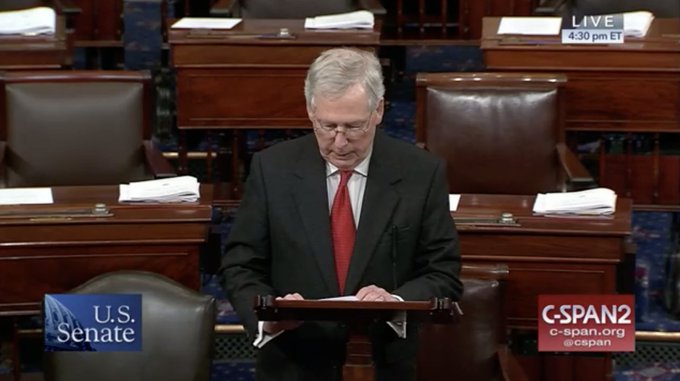On November 28, the Senate voted to move ahead with the nomination of Thomas Farr to the district court in North Carolina. All 49 Senate Democrats voted against Farr; Arizona Senator Jeff Flake, a Republican, also voted against Farr. This meant the vote was 50 to 50 and Vice President Mike Pence broke the tie, voting in favor of Farr’s nomination.
Farr’s nomination could come to a full vote by the end of this week.
Farr’s nomination has sparked outrage against many Democrats and civil rights activists, who say the Trump nominee has a history of involvement with white supremacist figures and has worked to suppress minority voters. But Farr’s defenders say he is a well-respected, solidly conservative lawyer who deserves a seat on the bench and should not be blocked based on an “ideological test.”
Here’s what you need to know:
1. Farr Worked as Legal Counsel for Jesse Helms’ Controversial 1990 Campaign
Back in 1990, Jesse Helms was running for re-election to the Senate seat for North Carolina. He won the seat, but his campaign remains controversial. Helms ran an ad, known as “Hands” which notoriously played into white fears about affirmative action. The ad showed a pair of white hands opening a letter; the voice-over says, “You wanted this job, but because of a law they had to give it to a minority.”
Helms’s campaign was also accused of carrying out voter intimidation by mailing out cards to voters in majority-African American neighborhoods. The cards were allegedly intended to discourage African Americans from voting in the Senate race.
During this time, Farr was the legal counsel for Helms’s campaign. It’s not clear what his role was in the campaign controversies, but his critics say that he knew more than he is letting on.
2. Farr Defended North Carolina’s Strict Voter ID Law
In July of 2013, North Carolina enacted a voter ID law which has been called one of the most restrictive in the country. The law requires voters to have government-issued photo-IDs when voting; it also shortens the period of early voting and in some cases makes it tougher to register to vote at all.
The North Carolina state legislature hired Farr to defend the law. During a hearing in 2016, Farr said, “I strongly deny that the legislature engaged in intentional discrimination. It was not a nefarious thing.” The law was struck down anyway, and Farr appealed that decision, saying, “the decision insults the people of North Carolina and their elected representatives by convicting them of abject racism.”
The court didn’t agree to hear the appeal.
3. Civil Rights Leaders Called Farr a ‘Product of the Modern White Supremacist Machine’
Civil rights leaders and Democratic politicians are up in arms about the nomination of Farr. In an op-ed last year, the president of the North Carolina chapter of the NAACP said that he had no doubt that Farr was perpetuating Jesse Helms’ “racist legacy.” The op-ed charges that Farr helped Jesse Helms to unleash a “huge propaganda machine that incited hostility toward African-Americans.” That “propaganda machine” inflamed racial tensions and led to the re-emergence of white supremacist groups in places like Charlottesville, the op-ed charges.
The NAACP is calling on senators to oppose Farr’s nomination on the grounds that he is a white supremacist. The op-ed reads, “Having practiced white supremacy for decades, Mr. Farr is not likely to withdraw. Every senator who condemned the racism on display in Charlottesville must vote to prevent it from having power in the federal judiciary.”
4. Farr Has Been Nominated for the Seat Three Times Before
This is the fourth time that Farr has been nominated for a seat on the federal court. In 2006, and then again in 2007, President George W Bush nominated Farr for a spot on the bench. He was also nominated by President Trump in 2017.
Farr’s nomination has been blocked three times so far.
This year, Senate Majority Leader Mitch McConnell filed cloture on the November 15. This limits the time for debate before a vote on Farr’s nomination. The nomination is expected to come to a vote by the end of this year, likely after Congress comes back from its Thanksgiving break.
5. Farr is a Partner at Ogletree, Deakins, Nash, Smoak & Stewart, Where He’s Defended Controversial Employment Cases
Farr got his law degree from Emory University and went on to earn a degree in employment law from Georgetown University. He is currently a partner at Ogletree, Deakins, Nash, Smoak & Stewart, P.C. where he specializes in employment law and constitutional law.
Farr’s critics say that he has “spent years working to undermine the rights of employees claiming unlawful and discriminatory employment practices.” They point to the fact that he once defended the car rental company, Avis, after it was sued for denying African Americans the right to rent cars on the same terms as white customers. Farr also defended a company where a supervisor told female employees that women should stay at home with their children instead of going out into the workplace.

